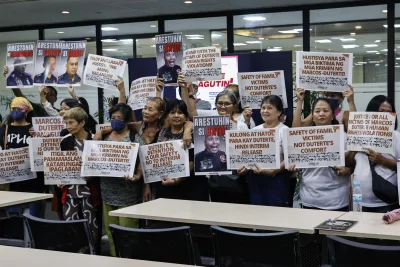ICC: Rodrigo Duterte fit for pre-trial hearings

Relatives of victims of alleged extra-judicial killings during the war on drugs campaign of former Philippine President Rodrigo Duterte hold signs after watching a broadcast of an International Criminal Court Appeals Chamber hearing, in Quezon City, Manila, Philippines, in November. The ICC ruled Monday that Duterte is fit for pre-trial hearings. File Photo by Rolex Dela Pena/EPA
Jan. 26 (UPI) — The International Criminal Court ruled Monday that former Philippine President Rodrigo Roa Duterte is fit to take part in pre-trial court proceedings and scheduled a hearing for Feb. 23.
Duterte’s defense team asked for an indefinite adjournment of the case because of his health, alleging that he wouldn’t be able to participate in his defense. The court had a panel of three medical experts to examine him. The panel sent a report on Dec. 5 with its observations, and the court said it was satisfied that Duterte was fit for pre-trial proceedings.
The Feb. 23 hearings will decide if there is enough evidence to charge Duterte. If the court decides the charges are valid, it will transfer the case to the trial phase.
Duterte, 80, is facing charges of crimes against humanity for alleged extra-judicial killings of suspected drug dealers and users in the Philippines.
In March 2025, Duterte was arrested in Manila on the ICC’s warrant after the ICC began a formal investigation in September 2021. In October, the court denied his release because he was deemed a flight risk and said he must remain jailed in the Netherlands. The national police in the Philippines say Duterte killed about 6,000 people in his war on drugs, but human rights groups say he killed 30,000.
